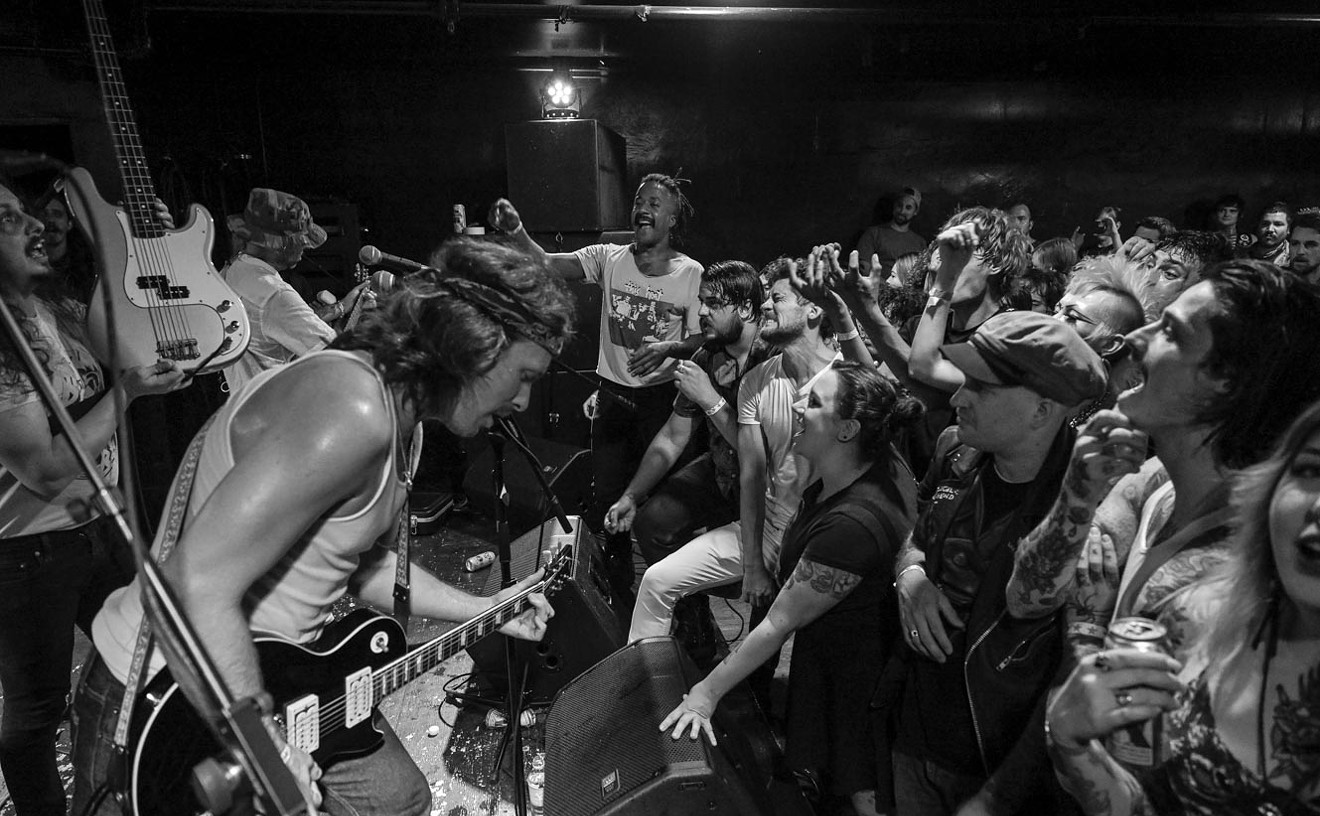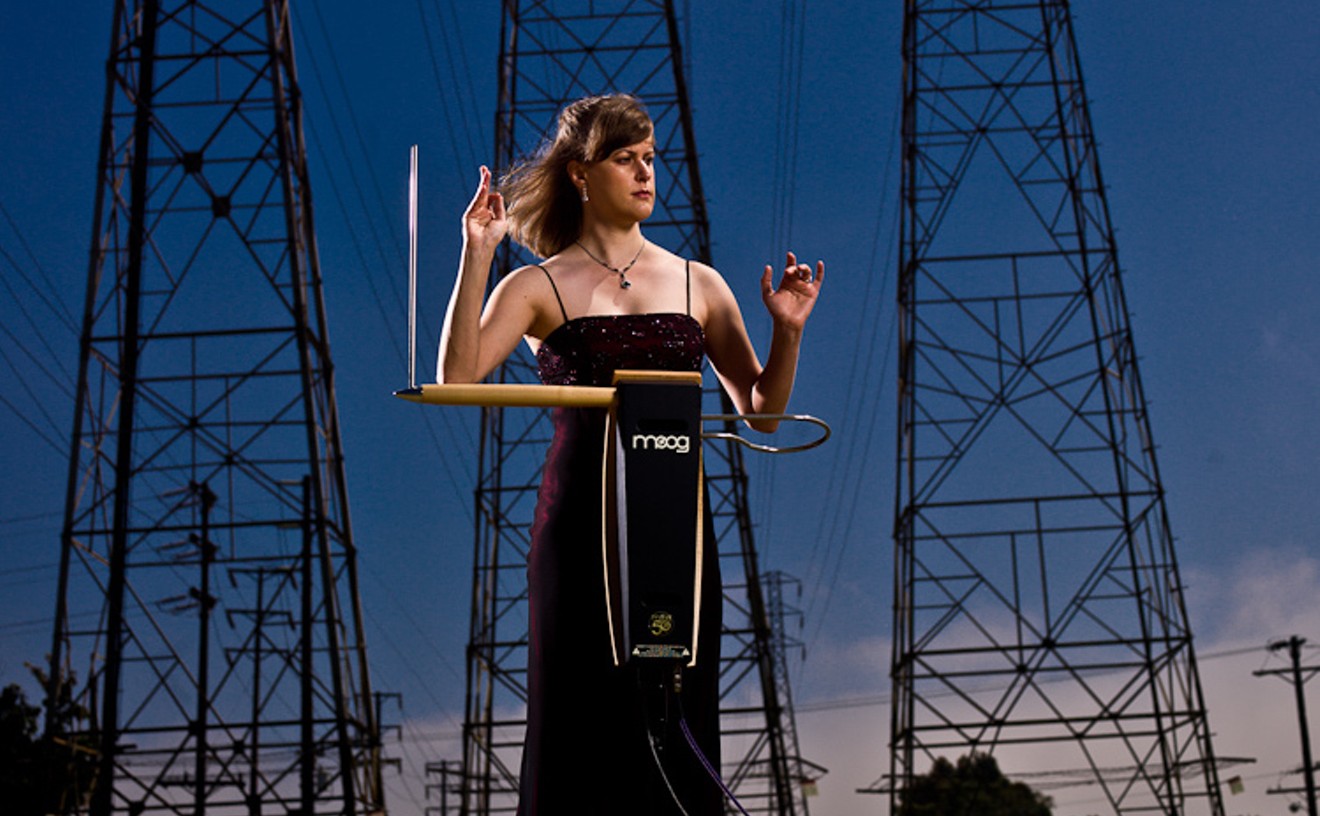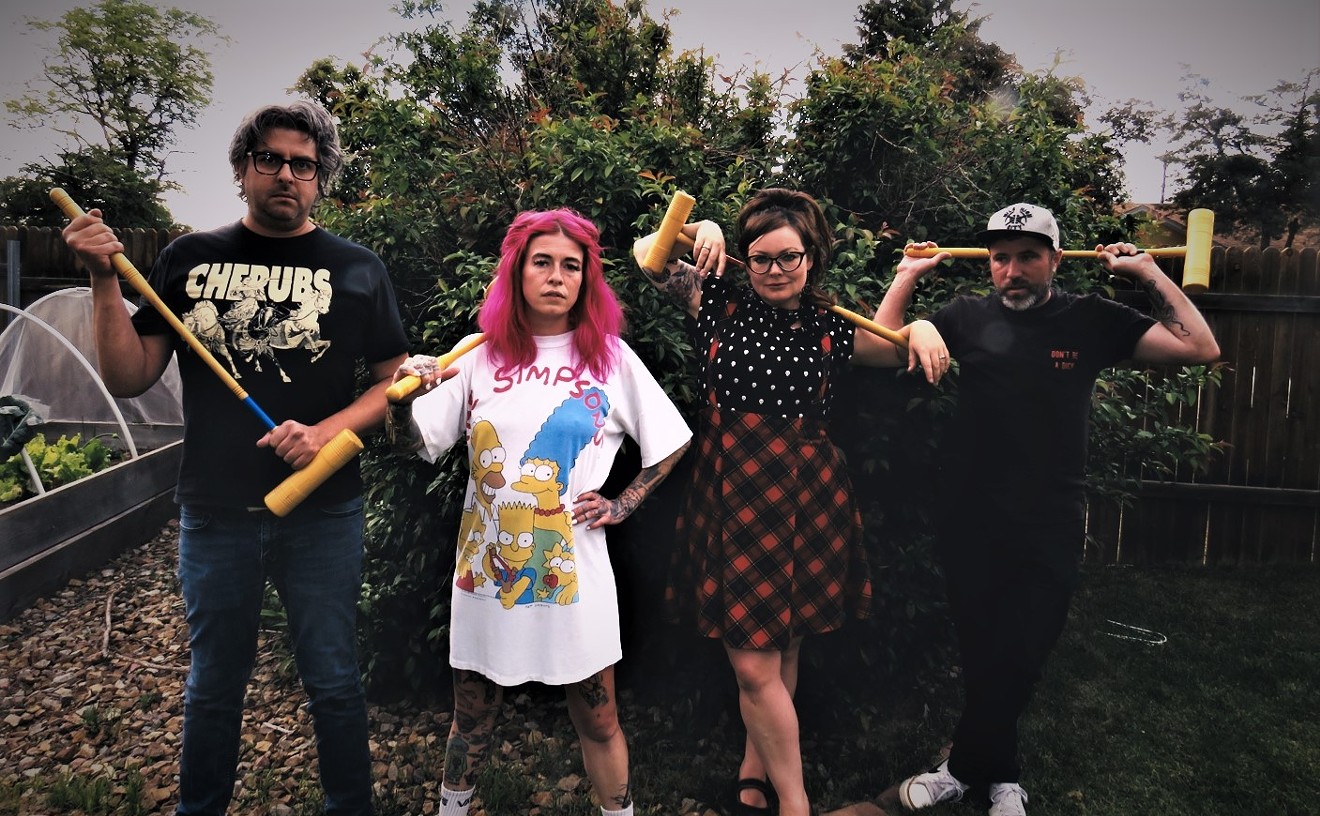Five Finger Death Punch formed in 2005, when Zoltan Bathory and Jeremy Spencer started putting together their next band. Ivan Moody, a singer who'd moved out to L.A. without knowing a soul and had been sleeping in his rehearsal space, heard the nascent project's demos and ended up joining the band. Originally from the Denver area, Moody proved to be a charismatic and cathartic frontman, and the band has since gone on to become one of the most popular bands in modern hard rock and metal.
Five Finger's latest record, a double album called The Wrong Side of Heaven and the Righteous Side of Hell, Volume 1, comes out at the end of July. We recently spoke with the gracious, humble and thoughtful Moody about his love for Denver, how he's looking to move back to Colorado, and how he's living out a dream working with Rob Halford on a song for the new record.
See also: - Sunday: Five Finger Death Punch - Rockstar Mayhem Fest at Fiddler's Green, 7/7/13 - Five Finger Death Punch's Ivan Moody on pouring his passion into his music - Rob Zombie on how he's not on tour to party and to fuck around
Westword: You grew up in Arvada?
Ivan Moody: Kind of a little here, a little there. I lived in Castle Rock a bit, mainly Arvada, but I also lived in Lakewood, Wheat Ridge and Northglenn.
When you were coming up, what music did you get into early on?
You know, from the day I can remember, I've been listening to just about every kind of music you can imagine. My grandmother was a country artist. My father and mother listened to oldies, from be-bop and swing music to -- I hate to admit it, but -- Barry Manilow, Fleetwood Mac and the Moody Blues. One of my first concerts ever was seeing Jethro Tull at Fiddler's Green, when I was twelve.
Hard rock I got into around twelve or thirteen. My uncle introduced me to Scorpions, Great White and everything rock. From there, I expanded out, and I listened to Nuclear Assault, Exodus, Megadeth, King Diamond and Misfits, of course.
How did you find out about that other stuff?
At that time, record stores were still big. Recycle Records was right off of 58th and Kipling. I used to go in there all the time, and they had that whole wall of used cassettes, and I took my allowance of twenty bucks a week, and I'd go and buy anything I could buy, anything that looked cool. I just liked experimenting with it. Music is universal, so I never really got pigeonholed in one style or another.
Back then, it also wasn't considered that weird to be into Nuclear Assault and Great White.
Absolutely. Back then, that's really what was happening. You're also talking about a time when Colorado had two major rock stations: KBPI and KAZY. They also had the Fox. You could listen to just about anything. You could turn the dial to the left and get one style and turn it to the right and get another.
Z Rock was also broadcasting back then, too.
Oh, that's right! That was based out of Colorado Springs? Affiliated with KILO?
I think so. KILO then, and to some extent now, mixes up classic rock with hard rock and metal in a good way.
Do you remember Saturday nights on Z-Rock, they used to play Dr. Demento? It was that one hour every Saturday night when I was supposed to be in bed, and I would turn the radio on and hear "Fish Heads" and "Dead Puppies."
When did you start playing or performing music of your own?
I've never played instruments. I've always been a singer or a writer, for that matter. But I started playing in bands when I was sixteen years old. I remember the first band I was in out there was at a club called the Wooden Nickel in Aurora. My first show ever was then, and they told me I could play the show but that I would have to leave right after I got off stage. From that point on, I knew that was my calling. I loved it so deeply. I played in countless bands in Colorado and eventually uprooted and moved to L.A.
As a vocalist and writer, who inspired you early on?
That's hard to say. My first vinyl was when I was six, Kilroy Was Here [by Styx]. Dennis DeYoung and Tommy Shaw were two of the first guys that really turned me on to harmonies. Then you've got Pantera, of course; Phil Anselmo made it okay for me to scream. He gave me a right to be pissed off. Alice in Chains.
There was a local singer there [Vinnie Stott] who played in Hallucinasia and Tyfoid Mary. He was one of first guys I ever saw live. They were actually from Las Vegas, and they moved to Colorado, and when they did that, it was a really big deal.
I used to go to their parties, and they'd be playing in the jam space there, and I remember all the local bands standing around their jam space listening to them. They were so unique and so rare. I remember seeing them that first time and thinking, "I want to be like that." I wanted people to be intrigued by what I was doing.
That practice space was downtown; I think it was down off Market Street. There were tons of bands there, everybody from Tread and Rogue and countless other projects. My band got a tiny space there, and we hung out at that time because we wanted to get to know everybody. Even Uncle Nasty's band, Horse, used to play there at that time.
My band then was originally called Wicked Jest. When Vince separated from Hallucinasia, they talked to me, and I played with them for a good year and a half. There was another band I was in called Less Than Zero. I dabbled in just about every kind of music you can do out there, and I think that's why I'm still so loyal and still loving of the scene. I think Colorado's just always been really unique when it comes to music.
A lot of people outside of here don't know that, so it's refreshing to hear that from someone who has had a great deal of success after going to another city to pursue making a life in music.
I used to work for a guy doing landscaping. He was in Brethren Fast. There's so many good artists out there, but people just seem to overlook it for some reason.
What kinds of places did you play out here other than the Wooden Nickel and Iliff Park Saloon?
The Bluebird. Some place called the Gravy House, which was a kitchen during the day. The Raven. Just about every place out there, minus the Fillmore before I got signed, which was the Mammoth Event Center when I was growing up.
What got you to go to L.A.? Was it a band, or did you go yourself?
You know, I really got dried up because there are so many great artists in Denver, and [it's just not recognized enough]. I did countless battles of the bands, I did that metal show with Uncle Nasty every weekend -- and I'm talking six or seven years of this drive and nothing was happening. Nobody was looking at us, nobody was talking to us. I knew in my heart that to excel at what I do, I had to go where other artists were.
Whether it was a great idea at the time or not, and the bridges I've burned, and everything else entailed with it, it was a necessary move. It's not that I regret it, but by the same token, I look back and I still kind of wonder if maybe I could have changed something locally. I think I made the right decision.
Did you have friends in L.A. before moving there?
No. I didn't know anybody out there, actually. Me and two of the musicians I was starting the project with, we rented a rehearsal space and we bought three couches. I'm not even bullshitting you. We stayed in this rehearsal space, and we played all the time. We got in the Troubadour and the Whiskey A-Go-Go, and so on and so forth.
We hung out at the Rainbow all the time. A lot of people don't understand that in L.A., they do what they call "pay to play." So they give you a hundred to two hundred tickets, and you have to sell them at ten dollars a piece. If you undersell two tickets, they don't allow you to play.
So there were times where we would dig in our own pockets and [pay the difference] and get on stage and open for whomever at seven o'clock at night. It's not what everybody thinks. It's hell on a high horse.
Hanging out at the Rainbow, did you run into Lemmy? It seems that everyone that hangs out there does.
Absolutely. Lemmy's the dude! He's got his own personal corner set up next to a little poker machine. It's awkward when I go back to L.A. because there's a lot of the same people that go there. You'd think they grow out of it, but it's one of those places like the Iliff Park Saloon because everybody ends up there one way or another.
Do you still live in Las Vegas at this point?
I do at the moment. I'm actually putting my house back on the market, and I'm looking to move back to Colorado.
Oh, really?
Yeah. I've got a lot of family and all my old friends are there. It was great to be at it for a while and get my feet wet, but home is home.
Your band is obviously successful enough at this point where you can live here, and when you're ready to some more writing, recording and touring, you can get together wherever you want.
Exactly. We all moved to Vegas together so that we could be together during the writing process. One of us moved to Florida, another to Oregon. It's not necessarily to be all over each other. Like I said, I just want to go home.
What is it about Colorado that makes it special for you?
It's just such a beautiful place. I've seen the world three times over, and I'll tell you what, man, Colorado encompasses every element of every other place [that I like]. You've got the mountains, you've got the plains, you've got forests, you've got major-league football and basketball -- stuff a lot of people take for granted in other places.
Not to mention, you can drink the tap water, which is unheard of in this day and age. There's just so many great fucking things about it. It still has a hard-rock station, a classic-rock station. It's got the Westword. I'm not stroking your dick, but there's a lot of places that aren't lucky enough to have something like that. For me, there's just so many positives to outweigh the negatives. There's a sense of family in Colorado; there's such a pride factor there.
This year you're putting out a double album?
It is a double album. Originally one of them was going to be called The Wrong Side of Heaven, and the second album was going to be called The Righteous Side of Hell. But then we sat back and thought that in this day and age that 25, 26 songs is a lot to digest. I get a new CD, and it takes me a month just to get into the entire thing, where I start getting acclimated to it, so to speak.
It seemed the more intelligent move was just to stagger the two. The other part of it is that when we went to the table initially, we looked at the CD itself in its entirety, and a lot of the time you grab the twelve best tracks and throw the rest out, or you shelve them for later use or whatever.
We sat there and listened to it, and went, "You know what? We don't hear anything on this that we're not proud of. So we have a choice to shelve it and put out a second album a couple of years from now, or release it all together." It seemed like a more rational idea just to get it all out on the table now. I'm so proud of it. It encompasses everything we've done as a band up to this point. I'm really stoked on it.
You have some interesting guests on this record, like Max Cavalera and Rob Halford.
Can you believe that? Jamey Jasta and Max Cavalera, we've toured with countless times. Really good friends. And everybody that knows me knows that I'm a huge Sepultura and Soulfly fan. So that was just a no-brainer. I asked Max, and he was so happy to try something on this.
The funny thing is that when he sent it back to me, he sang his parts in Portuguese and nobody told me that so I'm sitting the studio and I'm listening back to the track and I ask, "Did he change the fucking lyrics? Did he not like the song?" Zoltan [Bathory] was sitting next to me, and he says, "Dumbass, it's in Portuguese." And I was like, "Ohh! That's great."
The Rob Halford thing is the most surreal moment of my entire career. When we approached him, at first, we heard back that he was too busy doing the new Judas Priest album. And about a week later, he got the song and sat back and listened to it and called us directly and said, "I'm not only going to do the song, I'm going to fly to Vegas and do it with you in the studio."
My jaw hit the floor so fucking fast. I thought it was a joke. Later, I walked into the studio, and there he is, the metal god himself, singing one of the Five Finger Death Punch songs. It was such a moment. If you'd told me twenty years ago that was going to happen...it was fantastic. We even got Maria Brink from In This Moment. We even got Tech N9ne. It's really well-rounded, and I'm proud of it.
Oh, yeah, you do that cover of LL Cool J's "Mama Said Knock You Out." That's brilliant.
Yeah, it's kind of tongue-in-cheek. You know, Fiver Finger Death Punch doing "Mama Said Knock You Out." It was just really funny for us. Zoltan came to the table and said, "You know what, dude, I've got an idea for a cover song." Again, when he said it, I thought he was kidding. He sat down and he and Jeremy [Spencer] wrote the song out, and I came back into the studio, and I was so blown away by it.
And I was like, "Do you know what's really going to piss people off?" If you think about it, back in the '90s, it was [acceptable] to do the rap-rock thing. [So many] bands were doing it, from Limp Bizkit to Korn, Faith No More and so on and so forth. Nowadays it's almost sacrilege. Immediately, I'm like, "This is going to piss so many people off. Let's get Tech N9ne to come in here." Because that guy's an underground hero. He came in, and he was fucking fantastic.
Follow @Westword_Music











